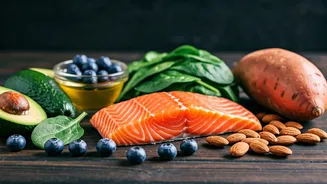Embrace the Power
Maintaining stable blood sugar levels is a cornerstone of good health, and the food we consume plays a vital role in achieving this balance. The body’s
ability to use glucose efficiently is essential for energy production and overall well-being. When blood sugar fluctuates wildly, it can lead to various health issues, including fatigue, mood swings, and even long-term complications. Fortunately, several natural foods can help regulate blood sugar levels, helping to keep it in a healthy range. This includes things like managing insulin sensitivity and slowing down the absorption of glucose. Integrating these foods into your daily diet can be a proactive step towards better health and a more balanced lifestyle, supporting your body's natural processes.
Fiber-Rich Foods
Fiber is a superstar when it comes to blood sugar control. Fiber, particularly soluble fiber, slows down the rate at which your body absorbs sugar. This gradual release of sugar into the bloodstream helps prevent the spikes and crashes associated with high blood sugar levels. Foods high in fiber include whole grains such as oats, brown rice, and quinoa. Vegetables and fruits like broccoli, berries, and apples are also excellent sources. In addition to regulating blood sugar, fiber promotes healthy digestion and can contribute to feelings of fullness, helping you manage your weight. Making a conscious effort to include more fiber-rich foods in your diet can be a simple yet effective strategy for improved blood sugar management and overall health.
Healthy Fats for Balance
Healthy fats are essential for overall health and play an important role in blood sugar regulation. Unlike refined carbohydrates, healthy fats are digested slowly, which can help prevent rapid increases in blood sugar levels. Incorporating foods rich in monounsaturated and polyunsaturated fats into your diet can be beneficial. These include avocados, nuts, seeds, and olive oil. Eating these fats helps improve insulin sensitivity, so your body uses glucose more efficiently. It's important to choose healthy fats over saturated and trans fats. Doing this offers you both nutritional benefits and helps with keeping your blood sugar in check. Remember, moderation is key, as all fats are calorie-dense, but including these healthy options is a step towards better blood sugar management.
Protein Powerhouses
Protein is another crucial component of a blood sugar-friendly diet. Protein helps slow down the digestion of carbohydrates, which reduces the impact on your blood sugar levels. Foods high in protein include lean meats such as chicken and fish, eggs, beans, and lentils. Protein not only helps manage blood sugar, but also promotes feelings of fullness, which can aid in weight management. When you pair protein with carbohydrates, it can mitigate the rise in blood sugar that often occurs after eating. Therefore, including protein in every meal or snack is a strategy for maintaining stable blood sugar levels throughout the day. It supports overall health by providing essential amino acids and supporting various bodily functions.
Vinegar's Impact
Vinegar, specifically apple cider vinegar, has been shown to improve insulin sensitivity and lower blood sugar levels, particularly after meals. Vinegar can help slow down the digestion of carbohydrates and reduce the blood sugar spike that can occur. You can incorporate vinegar into your diet by using it in salad dressings, marinades, or even by taking a small amount diluted in water before meals. While research supports vinegar's benefits, it is essential to use it in moderation and consult a healthcare professional. People who are taking medications for diabetes should use caution when introducing vinegar into their diet, as it may interact with their medications and cause blood sugar levels to drop too low.
The Spice Route
Certain spices have been shown to help regulate blood sugar levels. Cinnamon is one of the most well-known spices, it enhances insulin sensitivity and improves glucose uptake. Research also suggests that turmeric, ginger, and fenugreek seeds may have beneficial effects on blood sugar control. Adding these spices to your meals can be a simple way to support your blood sugar management efforts. Use cinnamon in your oatmeal or coffee, add turmeric to your curries, and experiment with ginger and fenugreek in various dishes. Remember, spices are most effective when combined with other healthy dietary strategies. The integration of spices can not only enhance the flavor of your meals but also contribute positively to your blood sugar control efforts.














